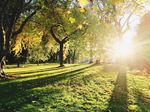Early on in the COVID-19 pandemic, an interesting paradox surfaced: While we were all cloistered inside, hiding from a virus that attacks our lungs (among many other things), the so-called “lungs of the earth” (aka trees) were doing their thing and helping to heal the environment — without us getting in the way.
Thanks to the sharp reduction in the carbon emissions while locked down, the air outside cleared up significantly — if only, for a brief time. (Remember the photos of empty freeways in Los Angeles or a vacant Times Square? Even the Himalayan mountains could be seen in northern India for the first time in decades.) The global decline in pollution was so dramatic during the initial coronavirus lockdown, it could even be seen from space.
"Everybody needs beauty as well as bread, places to play in and pray in, where nature may heal and give strength to body and soul alike."
Though the shift in pollution didn’t last long, we can take away the important lesson that nature heals, and not just itself. We are in a symbiotic relationship with the natural world — getting outside can do us a whole lot of good, which is all the more reason to protect the Earth from the catastrophic impact of climate change.
RELATED: Actionable Ways to Live More Sustainably
As renowned naturist and author John Muir said in 1912, "Everybody needs beauty as well as bread, places to play in and pray in, where nature may heal and give strength to body and soul alike."
Muir's contemporaries in the medical field grew to believe the same. Open-air treatment, as it’s called, was discovered over a hundred years ago during another outbreak — the Spanish Flu pandemic of 1918. “Medics found that severely ill flu patients nursed outdoors recovered better than those treated indoors," noted Robert Hobday, researcher and author of the book The Healing Sun, in this post on Medium. "A combination of fresh air and sunlight seems to have prevented deaths among patients and infections among medical staff.”
The point to be taken is simply that spending time outdoors can boost immunity and overall health. Here, some tips for harnessing Vitamin N (as in nature):
Exercise Outdoors On Your Own
Working out boosts immunity and serves as an incredible stress reliever. While it’s tempting to do a workout from the ease of your living room, taking your exercise outside can help you reap the benefits of open air and sun on your skin — aka vitamin D. Want to take it to the trails? Check out an app such as AllTrails to help you find a local hike.
Take a Forest Bath — Even in the City
Forest bathing, or shinrin-yoku, is a Japanese wellness practice that involves mindfully immersing yourself in a natural atmosphere to restore well-being and relax the mind. Research has found that “nature therapy” improves your mood, boosts your immune system and can even lower blood pressure. Learn how to practice forest bathing here.
Similarly, a practice called earthing — touching the ground with your bare feet — can reap health benefits. How so? Making direct physical contact with the vast supply of electrons on the surface of the earth promotes physical and psychological equilibrium and supports the body's immune and inflammatory responses. Just standing or walking in circles on a small patch of grass can do the trick.
Soak Up a Little Sun
It's widely accepted that maintaining healthy vitamin D levels has a correlation to immunity, and studies have specifically proven its impact on influenza. Many health experts (save for dermatologists) believe that 10 to 15 minutes of unprotected exposure to sunlight is a decent way to boost levels, so even stepping into your backyard or onto a balcony can supply a beneficial amount. Direct sunlight can also reset your circadian rhythms, which can improve sleep — another immune-system modulator.
If you can’t get outdoors, sit by a sunny window for a short time. Worst case scenario: Augment your supplement game with some extra vitamin D. According to Dr. Frank Lipman, THE WELL’s Chief Medical Officer, ideally, your levels should be in the 50 to 70mg/ml range, so have your doctor test yours when you can.
For most people — especially those who live in the northern hemisphere — a daily maintenance dose of 2,000 IUs of vitamin D3 a day could do the trick. People with darker skin tones may need additional supplementation since pigment-producing melanin decreases the absorption from the sun's rays.
"Direct sunlight can also reset your circadian rhythms, which can improve sleep — another immune-system modulator."
Make Friends with a Tree
In her video series Walk With Walsh, storyteller and wellness advocate Jennifer Walsh goes on strolls with CEOs, founders, innovators and philanthropists to talk about the role nature plays in culture and personal health. "The migration indoors has been exacerbated by the quarantine period, but it didn't start there," says Walsh. "We were already moving in that direction as a modern society." And that trend is bad for our health. "Our senses are atrophying," continues Walsh. "We are not touching, smelling or seeing things in the natural world like we did decades ago."
One way to get back in touch: Buddy up to a tree. Pinene, the terpene (aromatic organic compound) produced by conifers (pines) has anti-inflammatory, antioxidant, analgesic and even anti-tumor properties per this study; the minty scent emitted by eucalyptus trees is anti-depressive, as well as an effective cough suppressant.
When you can't get outside, turn to aromatherapy. The organic compounds found in essential oils are largely composed of terpenes and terpenoids, so diffusing them can also help to elevate your mental and physical state.
Walk or Bike to Get Where You’re Going
In urban areas, it pays to walk or bike to get where you're going. In cities across the country, the use of Citibikes and other e-bikes has spiked during the pandemic. Just having fewer cars on the road can and results in a meaningful decrease in the pollutant nitrogen dioxide (NO2), which can irritate and inflame the lungs and increase the risk of asthma. According to the Environmental Protection Agency (EPA), longer exposures to nitrogen dioxide may potentially increase susceptibility to respiratory infections. Considering COVID-19 continues to spread across the globe, now, more than ever, we have reason to heed that warning.





